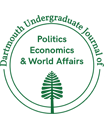Abstract
The radicalization of far-right political groups is becoming an increasingly dangerous problem in German politics. While Germany may be viewed as a fervent ally for liberal thought in Europe, the far-right Alternative for Germany (AfD) party is gaining substantial traction in national politics. Interestingly, the AfD has grown disproportionately by region, drawing more support from East Germany than West. The underpinnings of this trend hinge upon increased asylum being granted to Muslim immigrants and the long-held disdane by the East for the West’s economic successes. An understanding of the AfD’s popularity is integral to combating intolerance and radicalization within Germany as well as the threat of its spread throughout Europe.
Recommended Citation
Winograd, Sophia
(2021)
"The Radicalization of the Far-Right in Germany and Regional Disparities in Support,"
Dartmouth Undergraduate Journal of Politics, Economics and World Affairs: Vol. 1:
Iss.
3, Article 4.
Available at:
https://digitalcommons.dartmouth.edu/dujpew/vol1/iss3/4


